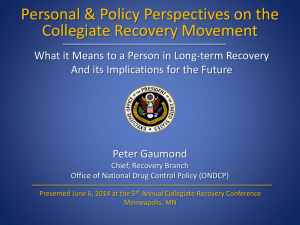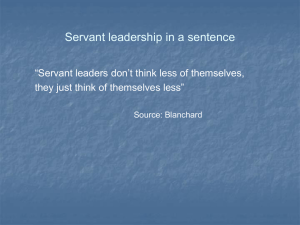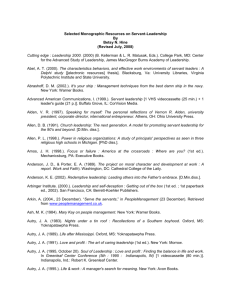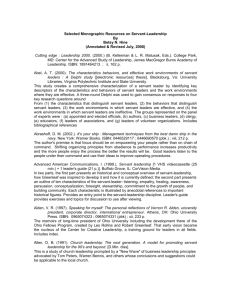Other People*s Shoes
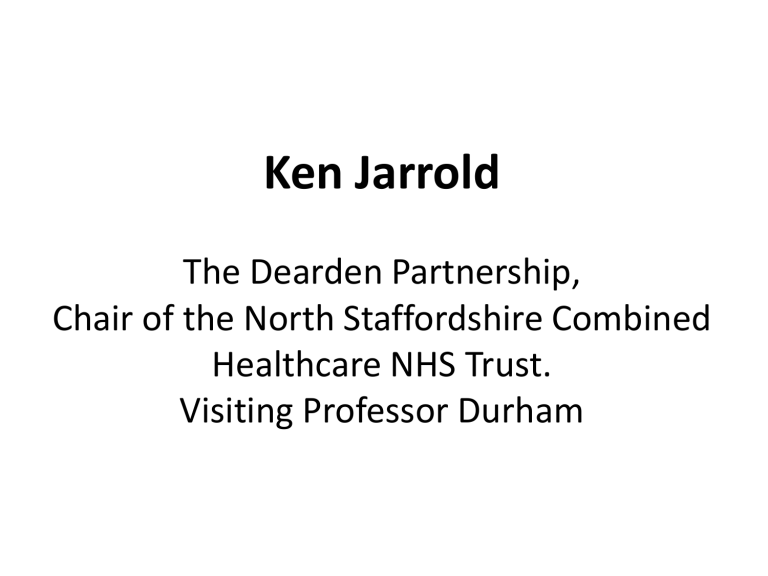
Ken Jarrold
The Dearden Partnership,
Chair of the North Staffordshire Combined
Healthcare NHS Trust.
Visiting Professor Durham
Other People’s Shoes
People, Performance, Leadership and
Management
Topics
• What is leadership and what is management?
– definitions
• Leadership in Health and Social Care
• Management in Health and Social Care
• Why are leadership and management important?
• What behaviours enable leadership to flourish?
Topics
• What behaviours are needed for successful management?
• What matters in leadership and management?
• Servant leadership and management
• Hard questions for Leaders and Managers
• 10 steps to leadership and management
• 3 principles for leadership and management in health and social care
What is leadership and what is and management? - definitions
• Leadership is showing the way – showing what to do next. Leadership is not dependent on role and seniority
• Management is the responsibility for the use of resources. Management is dependent on role and seniority.
Thoughts on leadership from Robert
Greenleaf to support the definition
• If the word leader is a mere synonym for boss it has no meaning at all
• Many occupy positions of great authority and contribute little to leadership
• No one should be made a supervisor to whom the workers do not go for guidance and council before they are supervisors
• A leader is one who goes out ahead and shows the way
Leadership in Health and Social Care
• Leadership in Health and Social Care can come from
• Patients, clients and carers
• Voluntary organisations and other agencies
• Professions and Trade Unions
• Managers at all levels including Chief
Executives
• Chairs, Non Executives and Politicians
Management in Health and Social Care
• There are 4 levels of managers
• Team Managers
• Senior Managers
• Directors
• Chief Executives
Team Managers
• Team Managers are the most important level of leadership
• Team Managers are at the interface between the management hierarchy and the front line staff
• Greenleaf on Team Managers – they were the spot where the buck stops. The elaborate executive hierarchy above them thought their great thoughts about what ought to be done.
What actually gets done is what these fellows were able [and to some extent] willing to do
Why are leadership and management important?
• People are one of the 3 factors in real change
• People are one of the 6 factors in performance management
• A high quality of leadership and management is positively associated with positive staff attitudes to work, their well being at work and with the achievement of organisational goals – see separate handout on Engaging leadership
– research by Beverley Alimo Metcalfe
Why are leadership and management important?
• Robert Greenleaf – no matter how much an executive knew about the technical side he had to get things done through people
People and the other 2 factors in real change
• Real change comes from three things
• 1 Developing people to their maximum capability and capacity. Peter Drucker on
Robert Greenleaf – he was always out to change the individual
• 2 Making process as effective and efficient as possible
• 3 Deploying resources effectively
People and the other 5 factors in performance management
• There are 6 key ingredients in performance management
• 1 Clarity about the objectives
• 2 Commitment to delivery – the will to do it
• 3 Evidence of progress – good quality information
• 4 Rigour – effective monitoring
People and the other 5 factors in performance management
• 5 Resilience and staying power – coping with setbacks and keeping going until the job is done
• 6 People – getting the best from the most important resource – leadership and management
What behaviours enable leadership to flourish?
• Understanding what leadership is
• Having the courage to show the way if you know the way – RKG management takes backbone
• Explaining what needs to be done clearly and simply
• Persuading people to follow the way
• Enabling others to lead the way if you do not know the way
What behaviours enable leadership to flourish?
• Following the way as shown by others
• Persuading people to follow the way as shown by others
What behaviours are needed for successful management?
• The quality of managers is crucial to the effectiveness, efficiency and well being of the people they manage –research by Beverley Alimo
Metcalfe, Michael West, CIPD, IES
• People need 4 things from their managers
• 1 Support
• 2 Feedback including appraisal
• 3 Development and training
• 4 Clear job content
1996 Study on the mental health of workforce in NHS Trusts
• Research by Carol Borrill, Michael West and colleagues
• The mental health of NHS staff is worse than that of the employed population as a whole
• 7 reasons identified
• Work demands
• Role ambiguity
• Role conflict
1996 Study
• Lack of social support
• Lack of feedback
• Lack of influence over decisions
• Professional compromise
Research on Teams
• Michael West’s work has resulted in the Aston
Team Development Programme
• Effective Teams deliver better patient satisfaction, performance and morale
• Effective Teams have;
• Clear identity and purpose
• Clear, agreed team objectives
• Role clarity
Research on Teams
• Effective teams have;
• Effective communication
• Appropriate involvement in decision making
• Constructive debate
• Good inter team working
• Meet regularly to review performance and adapt appropriately
Culture and behaviour in the English
NHS - BMJ 2013
• Study by Mary Dixon Woods, Michael West and colleagues
• Good staff support and management were highly variable though they were fundamental to culture and directly related to patient experience, safety and quality of care
• The importance of clear, challenging goals
• Organisations need to put the patient at the centre of all they do
Culture and behaviour in the English
NHS
• Organisations need to get smart intelligence, focus on improving organisational systems and nurture caring cultures by ensuring that staff feel valued, respected, engaged and supported
What matters in leadership and management?
• What matters is how you lead and manage
• What matters is what you say, what you do and how you behave
• The best test of servant leadership is do those we serve grow as people? – Robert Greenleaf
• The core idea of servant leadership is quite simple – authentic, ethical leaders who we trust and want to follow – are servants first -
RKG
Servant Leadership and Management
• Robert Greenleaf – the modern founding
Father of servant leadership with an international following
• 1904 – 1990, worked for AT and T 1929 – 1964 regarded as the conscience – the Abe Lincoln
• 1964 retired – a useful old age – life is growth and when growth stops there is atrophy
• The Servant Leader published in 1970
Servant Leadership and Management
• Peter Senge – tells people not to bother reading any other book about leadership until you first read RKG’s book Servant Leadership the single most important statement on leadership I have come across
• Kenneth Blanchard – author of the One
Minute Manager which sold more than 10 million copies – was enthralled with RKG’s thinking
Servant Leadership and Management
• Stephen Covey – the servant leadership concept is a principle, a natural law, getting our social value systems and personal habits aligned with this enabling principle is one of the great challenges of out time
• Warren Bennis – Servant leadership is a counterbalance to the glorification, deification and lionisation of leaders who have neglected or forgotten what they are there for
Servant Leadership and Management
• Warren Bennis – Robert Greenleaf’s writings are among the most original, useful, accessible and novel on the topic of leadership
Servant Leadership and Management
• Ten characteristics of the servant leader and manager defined by Larry Spears
• 1 Listening – RKG said listening is the premier skill and ran Listening courses at Harvard
• 2 Empathy – putting yourself in other people’s shoes – to know and understand each worker
• 3 Healing – people and organisations
Servant Leadership and Management
• 4 Awareness – constant scanning of the environment, searching questions about what to do
• 5 Persuasion - convincement, difficult and time consuming
• 6 Conceptualisation – perspective, goals, evaluate, analyse
• 7 Foresight – the failure to foresee is an ethical failure
• 8 Stewardship – looking after things
• 9 Commitment to the growth of people
• 10 Building Community
Hard questions for would be Leaders and Managers
• Warren Bennis and James O’Toole ask 9 hard questions of would be leaders and managers
• 1 Do you lead consistently in a way that inspires followers to trust you? RKG – trust is first. Nothing will move until trust is firm.
• 2 Do you hold people accountable for their performance and promises?
• 3 Are you comfortable delegating important tasks to others?
Hard questions for would be Leaders and Managers
• 4 How much time do you spend developing other leaders?
• 5 How much time do you spend communicating your vision, purpose, and values? Do people down the line apply your vision to their day to day work?
• 6 How comfortable are you sharing information, resources, praise and credit?
Hard questions for would be leaders and managers
• 7 Do you energise others?
• 8 Do you consistently demonstrate respect for others?
• 9 Do you really listen?
10 steps to Leadership and
Management
• 5 process steps
• 1 Listen to other People
• 2 Think about what they have said
• 3 Exercise judgement – come to a decision
• 4 Explain your decision and persuade others
• 5 See it through with courage
10 steps to Leadership and
Management
• 5 behaviour steps
• 1 Demonstrate your commitment to the work of your organisation and your belief in service improvement
• 2 Respect the people you work with and take delight in their development
• 3 Exercise empathy – put yourself in other people’s shoes
10 steps to Leadership and
Management
• 4 Build trust by acting with integrity and living your values
• 5 Act with humility and be willing to learn
3 principles for Leadership and
Management in Health and Social Care
• 1 Patients, clients and carers – first, last and always
• 2 Front line staff second. Managers should serve front line staff not the other way around
• 3 Treat people as you would wish to be treated – no bullying, no harassment, be just and fair
What people need from their managers
• Beverley Alimo Metcalfe’s survey of 2,500 NHS managers identified 7 important qualities that people most wanted in their managers
• 1 Concern for others
• 2 Ability to communicate and inspire
• 3 Decency
• 4 Humanity
What people need from their managers
• 5 Humility
• 6 Sensitivity
• 7 Respect for others
• Beverley Alimo Metcalfe summarised the 7 qualities as the manager being a servant not a hero
Key thoughts on Leadership and
Management
• Peter Griffiths Chair of the Foundation Trust network and former Deputy CE of the NHs in
England describes good leaders and managers as having 6 qualities
• 1 Passionate about high standards of service and looking for improvement
• 2 Being willing to learn and to admit mistakes
• 3 Seeking consensus
Key thoughts on Leadership and
Management
• 4 Concerned for the treatment of people
• 5 Having realistic visions
• 6 Committed to relationships with professional colleagues
Key thoughts on Leadership and
Management
• Beverley Alimo Metcalfe describes leadership and management as;
• A contact sport
• Being obsessed with values – living inside out
• Connecting what you do with who you are and those you serve
• Having more belief in others than they have in themselves and keeping the faith until they come to believe it for themselves
Key thoughts on Leadership and
Management
• Max du Pre said that leadership and management are about
• Polishing, liberating and enabling the gifts of others
• Bearing not inflicting pain
• Giving people space to exercise gifts and be themselves
• Behaving with consistent and dependable integrity
Key thoughts on Leadership and
Management
• David Wilkinson and Elaine Applebee courage is more important than charisma
• C S Lewis - courage is the master virtue because it makes the practice of all the other virtues possible
• Warren Bennis – real leaders and managers move the human heart, demonstrate integrity, provide meaning, generate trust and communicate values

